There’s something wrong with my opening chapter. I’ve edited it eight times, two of those were major overhauls, the rest tweaks. But still… just plain wrong, and the closer I get to the end of draft one (and I am real close now) the more preoccupied I become with the first chapter. I figured the best way to work out what was wrong, was to study the masters. Examine the books in my particular genre that have made it, and see how they do it. And you know what… They have a formula. They all have a set of things in common. I’m not suggesting I need to follow their formula exactly, I still want to be unique, but I can at least learn from it.
I’m a victim of having read too many posts about ‘how to write,’ and ironically, I am now sharing the lessons I’ve learnt! But I just can’t help myself. I want to write well, so I try to absorb as much as I can from others. But here’s the thing. You can read advice, and a lot of advice that all says the same thing and yet, it’s still not right for your book, or your genre or for you.
And that’s exactly where I went wrong. This makes me slap the keys and grit my teeth in frustration…
I’ve read countless articles, blog posts and even excerpts in published books that all say some derivative of this:
Start with a hook, throw your reader straight into the action, most writers end up cutting chapter one and starting at chapter two where the real action is.
Well you know what? I should have started at chapter sodding two, but not because that’s where the action is. But because it’s where the action isn’t .
Let me explain…
The genre I write is YA/NA Fantasy/Dystopian genre, the genre infamous for The Hunger Games, Divergent and Uglies to name but a few. So, that’s exactly where I went to study first chapters.
When I opened the first book – I just started reading because I didn’t know what I was looking for. I had planned on taking just the first line or two for thorough examination. But I realised pretty quickly that I was actually looking for something specific, I just didn’t know what till I read the first couple of books.
There are five excerpts below, I have copied the text from the beginning of each one, right up to the point where I found what I was looking for.
And what was it? Let me show you with an example, I’ve bolded the bits I was looking for:
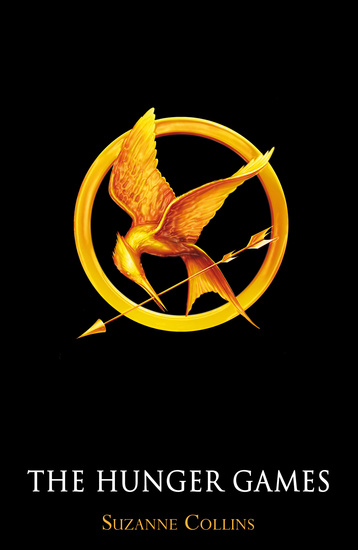 Hunger Games
Hunger Games By Suzanne Collins
Chapter 1:
When I wake up, the other side of the bed is cold. My fingers stretch out, seeking Prim’s warmth but finding only the rough canvas cover of the mattress. She must have had bad dreams and climbed in with our mother. Of course she did. This is the day of the reaping.
***
There you go, what I was looking for was in the first paragraph. Let me give you another example:
Divergent By Veronica Roth

Chapter 1:
There is one mirror in my house. It is behind a sliding panel in the hallway upstairs. Our faction allows me to stand in front of it on the second day of every third month, the day mother cuts my hair.
I sit on the stool and my mother stands behind me with the scissors, trimming. The strands fall on the floor in a dull, blond ring. When she finishes, she pulls my hair away from my face and twists it into a knot. I note how calm she looks and how focused she is. She is well-practiced in the art of losing herself. I can’t say the same of myself.
I sneak a look at my reflection when she isn’t paying attention—not for the sake of vanity, but out of curiosity. A lot can happen to a person’s appearance in three months. In my reflection, I see a narrow face, wide, round eyes, and a long, thin nose—I still look like a little girl, though sometime in the last few months I turned sixteen. The other factions celebrate birthdays, but we don’t. It would be self-indulgent.
“There,” she says when she pins the knot in place. Her eyes catch mine in the mirror. It is too late to look away, but instead of scolding me, she smiles at our reflection.
I frown a little. Why doesn’t she reprimand me for staring at myself?
“So today is the day,” she says.
“Yes,” I reply.
“Are you nervous?”
I stare into my own eyes for a moment. Today is the day of the aptitude test that will show me which of the five factions I belong in.
***
Boom, Roth did it too. She mentioned the word faction in her first paragraph. What do Factions and Reapings have in common? They are the fundamental constructs of their books. They are what makes their books unique. It’s the foundation of their dysoptia’s. I read a little further with Divergent, and highlighted another sentence. Let me give you another few examples of what else I found:
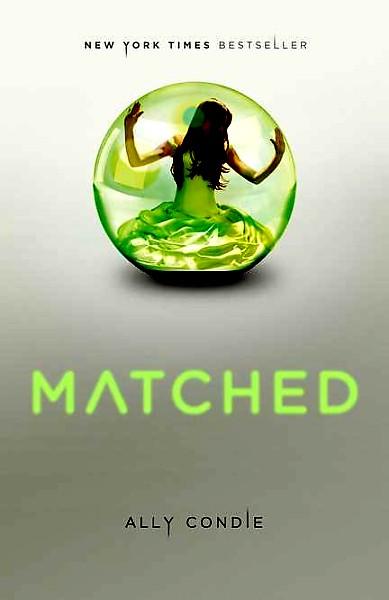 Matched
Matched By Ally Condie
Chapter 1:
Now that I’ve found the way to fly, which direction should I go into the night? My wings aren’t white or feathered; they’re green, made of green silk, which shudders in the wind and bends when I move – first in a circle, then in a line, finally in a shape of my own invention. The black behind me doesn’t worry me; neither do the stars ahead.
I smile at myself, at the foolishness of my imagination. People cannot fly, though before the Society, there were myths about those who could. I saw a painting of them once. White wings, blue sky, gold circles above their heads, eyes turned up in surprise as though they couldn’t believe what the artist had painted them doing, couldn’t believe that their feet didn’t touch the ground.
Those stories weren’t true. I know that. But tonight, it’s easy to forget. The air train glides through the starry night so smoothly and my heart pounds so quickly that it feels as though I could soar into the sky at any moment.
“What are you smiling about?” Xander wonders as I smooth the folds of my green silk dress down neat.
“Everything,” I tell him, and it’s true. I’ve waited so long for this: for my Match Banquet.
***
Uglies By Scott Westerfeld

Chapter 1:
The early summer sky was the color of cat vomit. Of course, Tally thought, you’d have to feed your cat onlysalmon-flavoured cat food for a while, to get the pink right. The scudding clouds did look a bit fishy, rippled into scales by a high-altitude wind. As the light faded, deep blue gaps of night peered through like an upside-down ocean, bottomless and cold.
Any other summer, a sunset llike this would have been beautiful. But nothing had been beautiful since Peris turned pretty. Losing your best friend sucks, even if its only for three months and two days.
***
Both Hunger Games and Divergent do the same thing as Uglies and Matched. They all start on the day of, or almost on the day of a graduation or coming of age event:
Hunger Games – starts with the reaping
Divergent – with the aptitude test
Matched – with the Match Banquet
Uglies – the pretty operation
What else do these first chapters do, other than the obvious introduction of the main characters, they:
Introduce you to the key tennets of the dystopian world and build an image of it.
They do it in a way that feeds you little drips and drabs of information though character thought and setting description. I’ll use on final example:
The Testing By Joelle Charbonneau
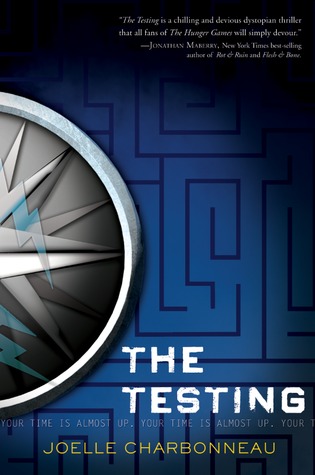 Chapter 1:
Chapter 1:
I can hardly stand still as my mother straightens my celebratory tunic and tucks a stand of light brown hair behind my ear. Finally she turns me and I look in the reflector on our living area wall. Red. I’m wearing red.No more pink. I am an adult. Seeing evidence of that tickles my stomach.
“Are you ready, Cia?” my mother asks. She, too, is wearing red, although her dress is made of a gossamer fabric that drapes to the floor in soft swirls. Next to her, my sleeveless dress and leather boots look childish, but that’s okay. I have time to grow into my adult status. I’m young for it at sixteen. The youngest by far in my class.
I take one last look in the reflector and hope that today is not the end of myeducation, but I have no control over that. Only a dream that my name will be called for The Testing.
***
celebratory tunic tells you it’s a significant event
reflector signals that it is not a world like ours, purposefully using the word reflector instead of mirror, a word similar enough for us to know what it means but different enough to signal the uniqueness of their world.
Red. I’m wearing red. No more pink. I am an adult. This does lots of things. It tells you age is denoted by colour – another indicator of dystopia. It tells you their world is likely controlled by a higher power who has decided colour is associated with age. It tells you the character is just becoming an adult. Charbonneau killed several birds with one stone, getting description of their attire, and describing a control mechanism in one fell swoop, as well as showing her age.
I have no control over that this confirms that there is a society or higher authority running their dystopian society, and that it controls and makes decisions about their lives
The Testing the construct that makes this world dystopian. The control mechanism and the coming of age plot device. The centre of this book.
***
So what did I learn? What top tips can we draw from these experts? We all know you have to introduce your main characters and that usual jazz, but I wanted to focus on the detail of the formula of these experts, so I haven’t covered the obivous. These guys clearly follow a formula – is it right for everyone? No, of course not. I’m just sharing what some people have written. This might not be right for you, and actually I hope it isn’t for everyone otherwise we will never have anything new on the market.
Let me know if you think I missed anything. And, let me know what lessons you have learnt from reading other writers first chapters.
1. Get the key dystopian construct into the book early. Really early. Whether it’s factions, testing or pretty surgery that makes the world dystopian, a reference or link has to go in somewhere in the first couple of pages.
2. None of these books start smack in the middle of the action. They all start just before the proverbial poop hits the fan. Think about how you can draw your reader in first, and then smash them with action in chapter two.
3. Create an image of the world through the characters thoughts and actions as well as through blatant setting description. You can kill two birds with one stone if you’re clever like Charbonneau who used a colour linked to a construct in their dystopian society. There are plenty of other ways you can do that if your world is detailed.
4. Details – ensure there is a balance of world description in chapter one to explain your world, but not so much it confuses the reader
5. If your protagonist is going to come of age – consider starting with it – especially if the ‘coming of age event’ is going to incite action for the rest of the book.
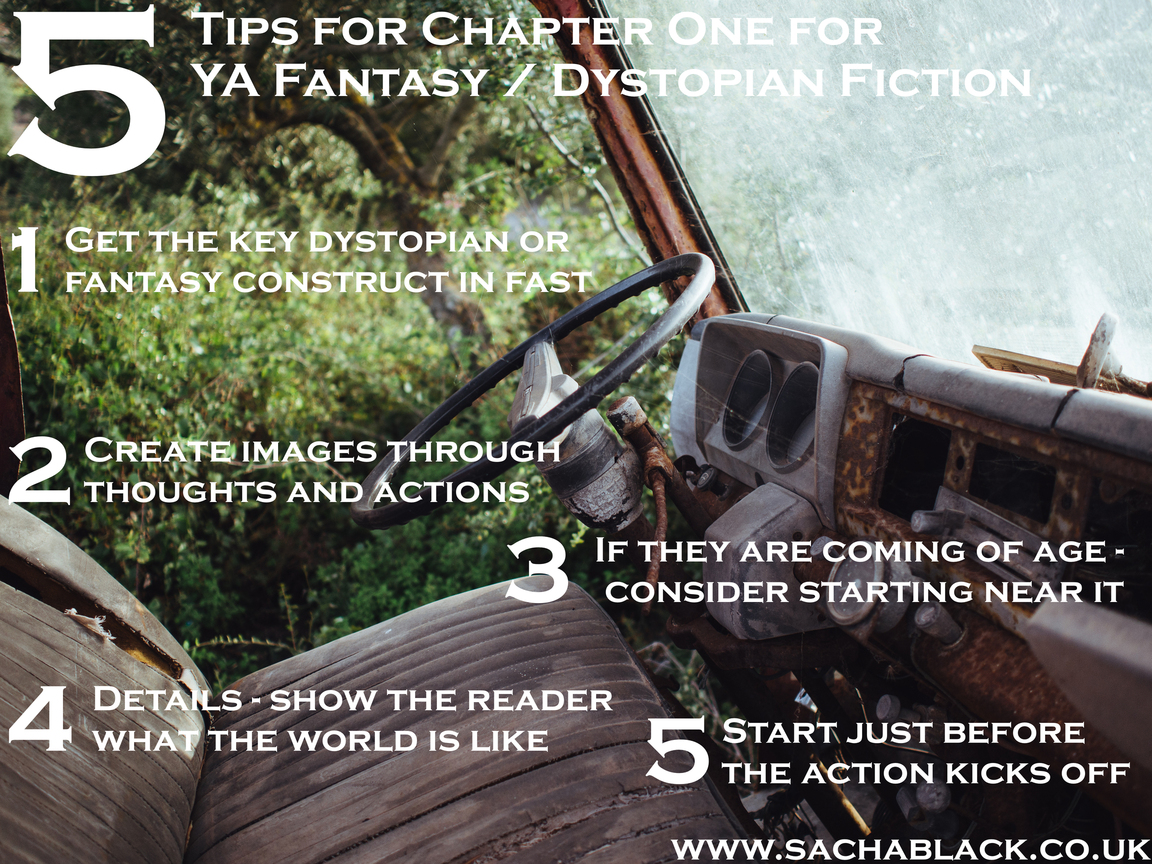
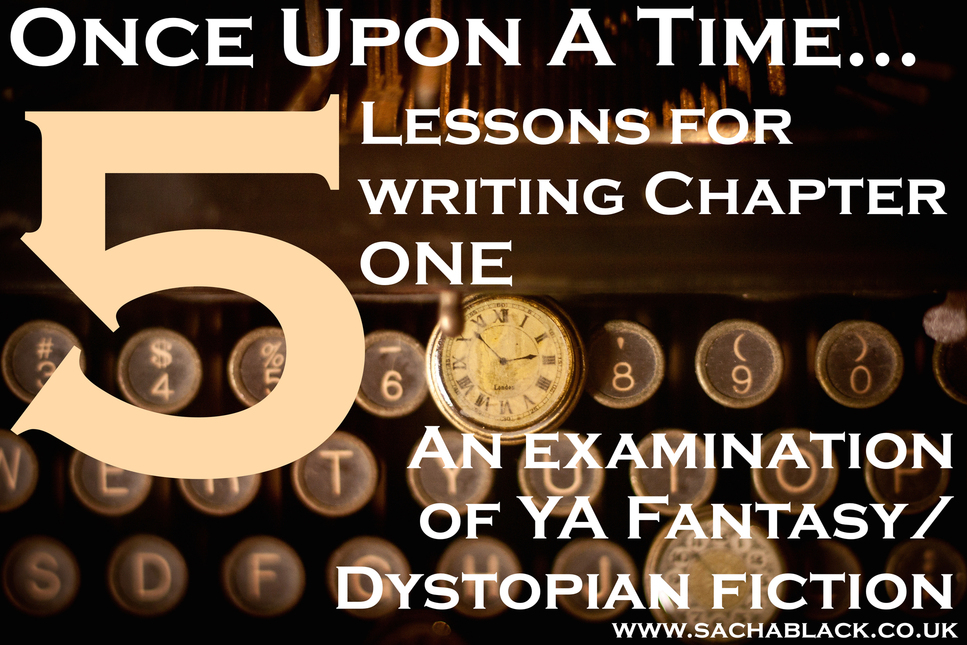
I really enjoyed reading this Sacha. I hope you have been able to get your first chapter sorted now that you have the (or this) secret. While YA, and particularly dystopian futures, is not a preferred genre for me I found I really enjoyed reading these story beginning. They certainly hooked me and I was intrigued thinking about where they would go from here. I like the way you have studied them to find what they had in common and then generously shared that information with us. I’m sure the tips will have wider application than to just this genre.
Sort of Norah, I certainly understand the problems with it, not sure I have it clear what I am going to do yet, but then, I tend to not know before I start writing anyway.
I am so glad you enjoyed the beginnings, I love when I find a new genre I like 🙂 especially when its new or unexpected.
🙂 and thanks Norah, you know me, can’t help but share the things I learn, I know it won’t be useful for everyone, but I hope its helpful to some at least.
Useful to many, I’m sure! 🙂
I love looking at how my writing heroes write! These are all fantastic examples of openings that really grabbed me. Thanks for breaking them down!
Thanks so much for reading and taking the time to comment. Who are your literary heroes?
Yes, they get right into the “action” in the sense that they’re bringing you into their world without guns blazing. These are great examples. Lauren Oliver’s “Delirium” trilogy starts with this:
“It’s been sixty-four years since the president and the Consortium identified love as a disease, and forty-three since the scientists perfected a cure. Everyone else in my family has had the procedure already.”
I’ve actually started delirium, haven’t got very far tho. But I will. I thought it started well too.
It’s interesting isn’t it – obviously I had misinterpreted what ‘action’ meant and taking some time out to study the pros has helped me understand.
You’re a lover of this genre – do you think I missed anything?
I think this is a fantastic post. I don’t think you missed a thing — it was so focused.
(I’m on Oliver’s second book in that trilogy, Pandemonium, now.) But, yes, they do all start the same way. Bringing the reader right into the dystopian society in whatever way is unique to that story. Brilliant.
aww thanks Sarah. 🙂 well you never know – sometimes people see things I don’t. What do you think of Olivers books?
Hmm… Honestly? I’ve seen striking similarities to other YA dystopians. For example, the Matched trilogy. Without giving too much away, I can’t say how similar. She’s a good writer, though. And the minor characters are stunning. Not too many pawns in this chess game. All in all, I liked them much better than Before I Fall.
I haven’t read before I fall either. You know the thing is, having studied the intros to the books, I am really starting to see a formula for them all. And they all sort of share similarities, its kind of enlightening and disappointing all at the same time. sigh. Clearly I just love a particular type of book!
Totally agree. But, like you, clearly I love them because I keep reading them. 😉
can’t help but snigger over this – clearly we are secret teens who never grew up. I really can’t help myself its a total guilty pleasure that never gets boring. Im a sucker for them!
Up next: Immortal Rules by Julie Kagawa or Grave Mercy by R.L. LaFevers. 😀
Excellent post and the examples were great. Heading over to my WIP to see how it measures up!
Thanks ? glad you liked it – are you writing in this genre?
Adult fantasy, but I believe the ideas still apply. I’m like you in terms of gathering all the ideas and advice I can and then seeing what works for the book (and me).
Ahh ok fab – I was worried about badging it as a panacea when it’s not! But I reckon some of this easily transfers across genres and age groups. I’m just glad it’s useful for others I had a light bulb moment when I researched this post!
How’s your writing going?
Slow. Too much fun blogging. Still searching for that elusive balance 🙂
Ha! snap! It’s my ultimate procrastination!
Sacha, I have been following this website: http://www.betternovelproject.com/blog/about/thanks/ in the writing of my novel. When I took creative writing in college it was stressed that there is a formula to fiction depending on the genre. Readers look for these cues and expect them. Let me know what you think. I love this site. I am employing the tips in the writing of my own novel.
Thank you what an amazing site, I have followed and will read their updates with interest. I’m fascinated that there could be a formula. I know there are lots of people who claim there are only 7 types of story or 21 types or… so on and so on. So its not an unusual idea but I am always interest when someone comes up with a new formula. so i will have a proper look when I have some time. 🙂
I am using it for my book. It is Fabulous. <3
Reblogged this on Jin Okubo 大久保 仁.
Thank you so much for the reblog I really appreciate it 🙂
Thank you so much. I hope you find something useful when you look back at your own 🙂
Sacha, I enjoyed reading this look into writing your first chapter. I hope you have your first chapter nailed down.
Thank you so much Sacha!! this is EXACTLY what i have been looking for. I have been studying the first 5 pages forever, via every blog and book i could find, but none of them gave direction and illustration for YA fantasy specific. Now i know how to fix those beginnings. Do you have any tips for conclusions, when you are writing a series in YA Fantasy?
Hey there, no problems I’m so glad you found it useful ??. I was thinking I should do another post looking at endings. Especially as I’m just about to write my own ending. Give me a couple weeks and I’ll write the post for you ?do you blog? What’s your site?
Excellent, Sacha. Insightful and well demonstrated.
As a writer I thought you might be interested to know that the expression is actually “one fell swoop” – not foul. This is a very old expression that comes from the hunting methods of birds of prey, who hover in place in mid air watching, and then fold their wings in and “fall” out of the sky on top of their prey. Xx
Thank you, I’ve edited that post and changed it to fell. Best Wishes